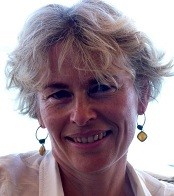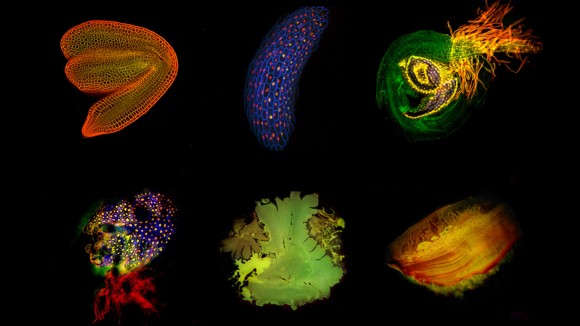 Karin Busch is full Professor at the faculty of Biology, Westphalian Wilhelms-University Münster, Germany. Her research focuses on mitochondrial bioenergetics and dynamics in live mammalian cells, e.g. by means of super-resolution fluorescence microscopy, the use of biosensors for mapping mitochondrial pH, ROS, membrane potential, ATP and diverse mitochondrial protein analysis methods. In particular, she has implemented Tracking And Localization Microscopy (TALM) of single fluorescence-tagged proteins to dissect the plasticity of the spatio-temporal organization of mitochondrial membrane proteins in conjunction with metabolic demands. Prof Busch has been an Editorial Board Member for Scientific Reports since 2018.
Karin Busch is full Professor at the faculty of Biology, Westphalian Wilhelms-University Münster, Germany. Her research focuses on mitochondrial bioenergetics and dynamics in live mammalian cells, e.g. by means of super-resolution fluorescence microscopy, the use of biosensors for mapping mitochondrial pH, ROS, membrane potential, ATP and diverse mitochondrial protein analysis methods. In particular, she has implemented Tracking And Localization Microscopy (TALM) of single fluorescence-tagged proteins to dissect the plasticity of the spatio-temporal organization of mitochondrial membrane proteins in conjunction with metabolic demands. Prof Busch has been an Editorial Board Member for Scientific Reports since 2018.
 Pascal Didier has been a full Professor of Biophysics at the University of Strasbourg, France since 2017. During his PhD (2001-2005) and postdoc (2005-2006) he extensively used femtosecond transient absorption spectroscopy to decipher the excited state dynamics of fluorescent proteins and metallic clusters. In 2006, he obtained an Assistant Professor position at the University of Strasbourg in the Laboratory of Bioimaging and Pathologies. With his background in optics, he developed single molecule TIRF-based microscope and super-resolution fluorescence imaging setups (STED and 3D PALM/STORM) as well as a two-photon microscope on which several quantitative approaches were implemented (Fluorescence Lifetime Imaging Microscopy, Fluorescence Correlation Spectroscopy and quantitative ratiometric imaging). These home-made experimental systems were used to characterize biomolecular interactions in living cells. In parallel, he continued to characterize the photophysical properties of molecular system as well as organic nanoparticles. Prof Didier has been an Editorial Board Member for Scientific Reports since 2019.
Pascal Didier has been a full Professor of Biophysics at the University of Strasbourg, France since 2017. During his PhD (2001-2005) and postdoc (2005-2006) he extensively used femtosecond transient absorption spectroscopy to decipher the excited state dynamics of fluorescent proteins and metallic clusters. In 2006, he obtained an Assistant Professor position at the University of Strasbourg in the Laboratory of Bioimaging and Pathologies. With his background in optics, he developed single molecule TIRF-based microscope and super-resolution fluorescence imaging setups (STED and 3D PALM/STORM) as well as a two-photon microscope on which several quantitative approaches were implemented (Fluorescence Lifetime Imaging Microscopy, Fluorescence Correlation Spectroscopy and quantitative ratiometric imaging). These home-made experimental systems were used to characterize biomolecular interactions in living cells. In parallel, he continued to characterize the photophysical properties of molecular system as well as organic nanoparticles. Prof Didier has been an Editorial Board Member for Scientific Reports since 2019.
 Shiguo Sun is a Professor at the Shaanxi Key Laboratory of Natural Products & Chemical Biology, College of Chemistry & Pharmacy, Northwest A&F University, China. His research interests are centred around the application of functional materials in light and electrochemistry, including fluorescence visualisation techniques for use in food safety, environmental modelling and other related fields. Prof Sun has also been involved in drug creation and visualisation, developing portable detection devices to help with drug delivery. Prof Sun has been an Editorial Board Member for Scientific Reports since 2015.
Shiguo Sun is a Professor at the Shaanxi Key Laboratory of Natural Products & Chemical Biology, College of Chemistry & Pharmacy, Northwest A&F University, China. His research interests are centred around the application of functional materials in light and electrochemistry, including fluorescence visualisation techniques for use in food safety, environmental modelling and other related fields. Prof Sun has also been involved in drug creation and visualisation, developing portable detection devices to help with drug delivery. Prof Sun has been an Editorial Board Member for Scientific Reports since 2015.
 Bo Tang is a Professor at Shandong Normal University in the College of Chemistry. He obtained a Ph.D. in Analytical Chemistry in 1994 from Nankai University. His current research interests focus on the synthesis of molecular and nano probes and their applications in biological imaging, green chemical production, solar chemical conversion and storage. He has published many papers in a number of high profile peer-reviewed journals and his work has been cited in excess of 20000 times. He has won numerous awards, including the second prize of National Natural Science Award of China, the second prize of National Science and Technology Progress Award of China, the first prize of Natural Science Award of Shandong Province, and the first prize of Science and Technology Progress Award of Shandong Province. Prof Tang has been an Editorial Board Member for Scientific Reports since 2015.
Bo Tang is a Professor at Shandong Normal University in the College of Chemistry. He obtained a Ph.D. in Analytical Chemistry in 1994 from Nankai University. His current research interests focus on the synthesis of molecular and nano probes and their applications in biological imaging, green chemical production, solar chemical conversion and storage. He has published many papers in a number of high profile peer-reviewed journals and his work has been cited in excess of 20000 times. He has won numerous awards, including the second prize of National Natural Science Award of China, the second prize of National Science and Technology Progress Award of China, the first prize of Natural Science Award of Shandong Province, and the first prize of Science and Technology Progress Award of Shandong Province. Prof Tang has been an Editorial Board Member for Scientific Reports since 2015.

